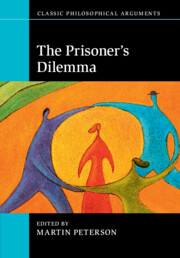Book contents
- Frontmatter
- Contents
- List of contributors
- Introduction
- 1 Why all the fuss? The many aspects of the Prisoner's Dilemma
- 2 How I learned to stop worrying and love the Prisoner's Dilemma
- 3 Taking the Prisoner's Dilemma seriously: what can we learn from a trivial game?
- 4 Prisoner's Dilemma doesn't explain much
- 5 The Prisoner's Dilemma and the coevolution of descriptive and predictive dispositions
- 6 I cannot cheat on you after we talk
- 7 Prisoner's Dilemma cannot be a Newcomb Problem
- 8 Counterfactuals and the Prisoner's Dilemma
- 9 The Tragedy of the Commons as a Voting Game
- 10 The role of numbers in Prisoner's Dilemmas and public good situations
- 11 The inner struggle: why you should cooperate with people you will never meet again
- 12 Prisoner's Dilemmas, intergenerational asymmetry, and climate change ethics
- 13 Prisoner's Dilemma experiments
- 14 The lesson of the Prisoner's Dilemma
- Bibliography
- Index
12 - Prisoner's Dilemmas, intergenerational asymmetry, and climate change ethics
Published online by Cambridge University Press: 05 July 2015
- Frontmatter
- Contents
- List of contributors
- Introduction
- 1 Why all the fuss? The many aspects of the Prisoner's Dilemma
- 2 How I learned to stop worrying and love the Prisoner's Dilemma
- 3 Taking the Prisoner's Dilemma seriously: what can we learn from a trivial game?
- 4 Prisoner's Dilemma doesn't explain much
- 5 The Prisoner's Dilemma and the coevolution of descriptive and predictive dispositions
- 6 I cannot cheat on you after we talk
- 7 Prisoner's Dilemma cannot be a Newcomb Problem
- 8 Counterfactuals and the Prisoner's Dilemma
- 9 The Tragedy of the Commons as a Voting Game
- 10 The role of numbers in Prisoner's Dilemmas and public good situations
- 11 The inner struggle: why you should cooperate with people you will never meet again
- 12 Prisoner's Dilemmas, intergenerational asymmetry, and climate change ethics
- 13 Prisoner's Dilemma experiments
- 14 The lesson of the Prisoner's Dilemma
- Bibliography
- Index
Summary
12.1 Introduction
Climate change is happening, and human activity is the cause. What are we going to do about it? Bill McKibben calls this “the most important question that there ever was.” It is a practical question, but it also raises some philosophical issues. My goal in this chapter is to examine these philosophical issues. They include matters of self-interest and rational choice, and they include moral issues about the value of nature, the nature of human values, and difficult issues about international justice and intergenerational morality.
A number of writers have pointed out that climate change has remarkable spatial and temporal characteristics. It is a global problem and a paradigm of what game theorists call the Prisoner's Dilemma. The fundamental characteristic of a Prisoner's Dilemma is that if each agent successfully pursues its rational best interests, the result is collectively worse for each of them than some other possible result. I will discuss this issue in Section 12.3 below.
The temporal problem is an illustration of intergenerational asymmetry, or what some philosophers call the “tyranny of the present.” In each generation, people must decide whether they will collectively accept some costs in order to reduce greater harms and costs in the future or continue to pursue short-term gains and pass the problem on to the next generation. Because future people do not exist, they cannot bargain, reciprocate, compensate, reward, or punish us for what we do. I will discuss the implications of this asymmetry in intergenerational morality in Sections 12.4 and 12.5.
Both of these philosophical problems are familiar, and I will have little to add to the technical analysis of them. Once one understands and accepts the central facts about climate change, moreover, it is easy enough to formulate principles that tell us what we must do to avoid causing the worst harms and to mitigate the future harms we have already caused.
- Type
- Chapter
- Information
- The Prisoner's Dilemma , pp. 219 - 242Publisher: Cambridge University PressPrint publication year: 2015
- 1
- Cited by

